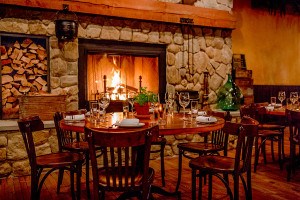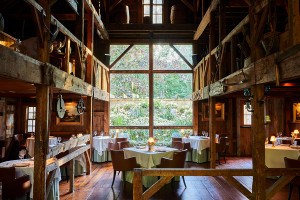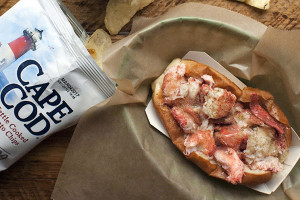Dining Out: Family Style
Of course, the name is inaccurate. David and Bob Kinkead aren't rivals: They're good friends. David even became a chef because he admired his older brother so much. They're both expert, experienced cooks, and they wanted to have fun by opening a restaurant together. When they got the chance to be the big opening act at Atelier 505—Boston's highest-profile condominium building to open in years, right next to Boston's most important new theater to open in decades—the brothers naturally took it. And Sibling Rivalry was a name they couldn't resist.
It helps that Bob Kinkead is one of the country's most respected chefs, a Washington icon whose name on a restaurant is a guarantee of comfortable surroundings and service and satisfying food. His Kinkead's, near the White House, helped redefine American cuisine in the early 1990s with a renewed emphasis on local ingredients, big flavor, and polished but unfancified food. Bob Kinkead was a figure in Washington very much as Jasper White and Lydia Shire are in Boston. (Their careers interlace.) His flourishing restaurant is still the natural first stop for politicians arriving in DC and for the kind of businessmen who bought out Atelier 505's condos before its doors were even open.
Sibling Rivalry feels similar to Kinkead's—comfortable but unpretentious, lively but not frenzied, somewhere between urban and suburban. There's a big bar with views of Tremont Street, which has begun to look alarmingly like the SoHo of 10 years ago. That is, where there had been artists, gay men, and tangential characters, there are now well-heeled couples clearly fresh out of the suburbs. Hamersley's Bistro, at the other end of the block, paved the way, bringing haute Boston to what was formerly a raffish cityscape. Today the sweeping brick sidewalk is immaculate, the buildings new and expensive or old and expensively restored. It's a sea change, and Atelier 505 and Sibling Rivalry are the gleaming buoys.
There's a lot of good, polished food at Sibling Rivalry, food to please the neighborhood newcomers and the old urban pioneers who can afford it. But you'll spend a lot of time looking at the menu to find it. The menu is organized the way chefs think—at least, the way these two chefs think—and not the way diners do. It's divided into two columns, one for David and one for Bob. And it isn't just dueling apps and dueling mains. That would be too easy. Each side is divided by ingredient—chilies, say, or offal or ginger or bacon—with one dish per brother riffing on the selection. The complexity doesn't stop there: The dish can be either an appetizer or main course, with the appetizers shown in red and the main courses in black.
Got it? I didn't think so. The unwieldy, head-scratching conceit is bound to change. And when it does, maybe the style of food will come into focus, too, though maybe not. The food is by turns whimsical, French-based, Asian-themed, and very American, and sometimes all of those at once. In other words, what the cooks feel like cooking. That means most dishes have real personality, something too rare in restaurants today.
David Kinkead has been waiting a long time to run his own kitchen after serving as the opening chef at such well-known mainstays as Brasserie Jo and Kingfish Hall. (Bob visits Sibling Rivalry once or twice a month, but it is David who oversees the kitchen nightly.) Because both Kinkeads are experienced and caring cooks, all the dishes feature excellent-quality, fresh ingredients, and many are pretty to look at. But the styles are too wide-ranging to make much sense of. It's a jumble—a fun jumble, but a jumble nonetheless.
Take three soups, each of them admirably distinct in flavor: Yucatán tuna soup ($10), vibrantly flavored with roasted poblano chiles and tomatillos, drizzled with a fresh cilantro sour cream and scattered with neat-to-eat fried tortilla strips; creamy, Madeira-spiked chestnut soup ($12) with chanterelle pieces and a foie gras flan; and garbure ($9), a classic soup of southwestern France, a region where every farm raises ducks, and housewives use duck stock as a base for a clear, deeply satisfying soup of cabbage and white beans. David Kinkead adds to his garbure not just the usual flecks of homemade confit, but also crumbled pork sausage, bacon, and bread dumplings. He is not content to leave his superb handiwork alone—the influence, perhaps, of his long collaboration with Todd English, several of whose restaurants he opened in addition to the still-better-than-most Kingfish Hall. I enjoyed all the soups, and I would happily eat the garbure several nights a week. But it is hard to find the connective thread beyond two chefs doing what they love and strutting their stuff (the logo is, after all, two proud roosters facing off).
Bob is a bit more restrained than his exuberant brother. The chestnut soup, for example, bears his stamp of luxe, his unshowy but impressive technique (the silken foie gras flan), and his conviction that a finishing touch of butter and cream never hurt anyone. His scallops wrapped in real Smithfield ham, then roasted in sherry butter with endive braised in cream in a pretty tart shell ($26), were classic Bob Kinkead: Every bit was rich and intensely flavored, the whole dish a masterly combination of French technique and proudly American ingredients. I really like eating this kind of dish at Kinkead's in Washington or at Bob's American-themed Colvin Run Tavern across from a very upscale suburban mall at Tysons Corner, Virginia. And I'm glad to have Bob's food in Boston, albeit largely channeled through his brother.
At Sibling Rivalry, I like the new whimsy and inventiveness—from both brothers—even better. One guest couldn't resist David's “Ritzy cod” ($25), a fat square of cod roasted with a buttery topping of crushed Ritz Crackers held in place by a shrimp mousse livened with lemon zest and chives. Neither could I. David and Bob love to play with Asian flavors, and they do it well in, say, David's relatively straightforward Thai curry broth with ginger, coconut milk, and kaffir lime leaves to which steamed Duxbury mussels add their juices ($11). David's sushi-grade tuna in fermented black bean sauce has, as the cook says, a little of everything: homemade gingery pork wontons, a few steamed littlenecks, baby bok choy, wasabi. It's an overcrowded plate, but a lot of fun to eat.
Don't bother with dessert. These boys are savory chefs. Enjoy instead a dessert wine from the good, not-too-long list. You won't miss dessert after such a whiz-bang parade of flavors. As for the trouble putting a label on this picture, maybe that's something only critics worry about. There's no confusion that Sibling Rivalry is a handsome showcase for real talent and that two old hands are having a good time showing it off.


